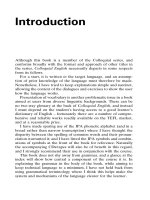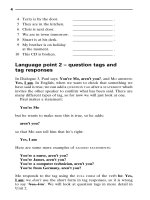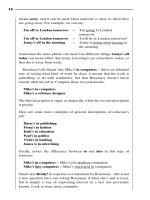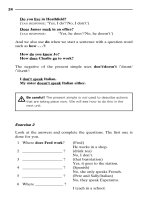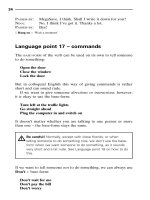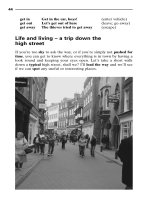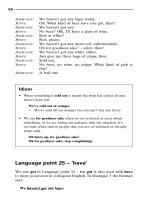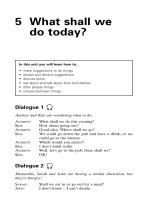Tài liệu A complete English language course part 15 pptx
Bạn đang xem bản rút gọn của tài liệu. Xem và tải ngay bản đầy đủ của tài liệu tại đây (139.83 KB, 10 trang )
S
COTT
: OK, OK. Well . . . we could go to Maria’s party.
J
USTINE
: That’s fine, but only if you promise to be nice to her.
S
COTT
: I’ll try, but it’s very difficult. I just can’t help laughing
at her pictures.
J
USTINE
: You’ll have to avoid looking at them, or pretend to
like them. If you can’t manage to do either of those,
then I’m not coming.
S
COTT
: You’re really putting me off going now, Justine.
J
USTINE
: OK, what else could we do?
S
COTT
: Well, why don’t we just decide to stay in? I don’t mind
ordering a pizza for us. Besides, Maria’s parties are
usually pretty useless, aren’t they?
J
USTINE
: True.
Language point 49 – more about state
verbs
In Language point 45 in the last unit we saw that state verbs in
English describe a situation that exists permanently or for a long
time, and that these verbs usually don’t appear in the present contin-
uous:
I like
curry not ‘I’m liking curry’
This book belongs
to me not ‘This book’s belonging to me’
See and feel are on the list of state verbs in Language point 45, but
in Dialogue 4 of this unit Sarah uses both of them in the present
continuous:
She’s not feeling
very well
She’s seeing
him later on
In the first sentence Sarah is talking about a temporary situation –
a situation that won’t last long; so the usual
STATE
meaning of feel
doesn’t work here and we can use the present continuous.
124
Idiom
• pretty useless means ‘not very good’ or even ‘quite bad’
Now look at the second example.
Some state verbs in English have secondary meanings which
describe actions. Here are some examples:
(state) have = possess
(action) have = receive; eat food
(state) think = believe; have an opinion
(action) think = think about something; turn something
over in your mind
(state) look = have appearance
(action) look = use your eyes to see
(state) see = understand
(action) see = visit
So when Sarah says:
She’s seeing him later on
she’s using the action meaning of see (‘visit’), and so the present
continuous is correct.
Here are other examples using the verbs above:
Adrian has
a yellow car (possess)
Adrian’s having
eggs for lunch (eat food)
I think
this book’s wonderful (opinion)
Be quiet – I’m thinking
(think about something)
Candace looks
cross (has appearance)
Candace is looking
at her desk (use eyes to see)
Exercise 4
Decide between the two choices in the brackets – you will have to
consider whether the verb is used in its action meaning or its state
meaning.
1 I (’m thinking/think) hard about that question.
2 (Are we having/Do we have) eggs for breakfast this morning?
3 You (look/’re looking) very like your sister.
4 Tom (thinks/’s thinking) Indian food’s good for you.
1111
2
3
4
5
6
7
8
9
10
11
1211
13
14
15
16
17
18
19
20
21
22
23
24
25
26
27
28
29
30
31
32
33
34
35
36
37
38
39
40
41
4211
125
5 What’s that book you (look/’re looking) at?
6 I (don’t see/’m not seeing) what he means.
7 Simon (has/’s having) a second-hand Ferrari.
8 Dave (doesn’t see/isn’t seeing) his girlfriend this weekend.
Language point 50 – -ing and to-forms
after verbs
In colloquial English there are different ways of joining two verbs
together. In Dialogue 5 Scott says:
I can’t wait to
see the new Johnny Depp film
but I can’t help laughing at her pictures
Some verbs are followed by the
TO
-
FORM
of the second verb, while
others are followed by the
ING
-
FORM
, and it’s important to learn
which is correct with each verb – if you get them wrong it will sound
wrong!
I can’t wait to see you not ‘I can’t wait seeing you
’
I can’t help laughing not ‘I can’t help to laugh
’
Here are some common verbs and verb phrases followed by -ing
or to:
Do you fancy promise
Do you feel like arrange
I can’t help seem
avoid + -ing pretend + to
put off decide
I don’t mind I can’t wait
I hate
• Do you fancy doing . . . ? and Do you feel like doing . . . ? both
mean Would you like to do . . .?
• I can’t wait to do . . . means I’m very keen/impatient to do . . .
• I don’t mind doing . . . means I’m happy to do . . .
When you put someone off doing something, you persuade them
not to do something.
126
Good learners’ dictionaries will always tell you whether to use -ing
or to after a verb or verb phrase.
Exercise 5
This exercise is to give you dictionary practice – you will need a good
learners’ dictionary of English. Decide whether to use the
TO
-
FORM
or the
ING
-
FORM
in the following sentences. The first one has been
done for you.
1 I can’t wait (see) the new film.
I can’t wait to see the new film.
2 Don’t forget (order) the tickets.
__________________________ .
3 She promises (come) back later.
__________________________ .
4 The government is offering (help) with the costs.
__________________________ .
5 I always enjoy (have) dinner with Julie.
__________________________ .
6 Remember (lock) the door.
__________________________ .
7 Suzie hates (do) the shopping.
__________________________ .
8 We’re going (swim) this afternoon.
__________________________ .
9 I don’t want (offend) him.
__________________________ .
10 Why don’t you give up (smoke)?
__________________________ ?
11 We can’t avoid (see) them.
__________________________ .
12 Will Brenda decide (apply) for that job?
__________________________ ?
13 I don’t mind (pay) the bill.
__________________________ .
1111
2
3
4
5
6
7
8
9
10
11
1211
13
14
15
16
17
18
19
20
21
22
23
24
25
26
27
28
29
30
31
32
33
34
35
36
37
38
39
40
41
4211
127
14 Do you fancy (learn) yoga?
__________________________ ?
15 You don’t happen (know) where he is, do you?
__________________________ ?
16 Dave doesn’t really like (cook).
__________________________ .
17 I’d better pretend (be) ill.
__________________________ .
18 James needs (fly) to Australia next week.
__________________________ .
19 We hope (see) you all again soon.
__________________________ .
20 We’d better put off (see) them till next week.
__________________________ .
Language point 51 – ‘else’
Else means ‘other’; but it’s only used with:
1
PRONOUNS
ending in -one, -body and -thing, for example:
anyone else (= any other person)
nobody else (= no other person)
nothing else (= no other thing)
someone else (= some other person)
2 the place adverbs somewhere, anywhere and nowhere:
somewhere else (= in some other place)
nowhere else (= in no other place)
anywhere else (= in any other place)
3 question words:
who else?
what else?
where else? (= in what other place?)
why else? (= for what other reason?)
how else? (= in what other way?)
when else? (= at what other time?)
128

